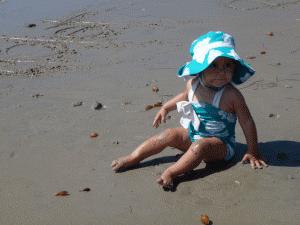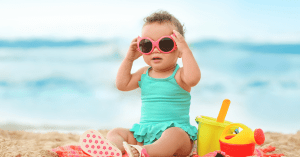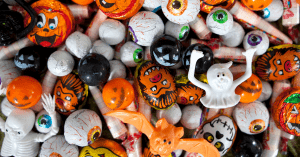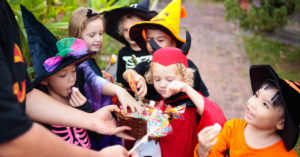Making sense of what you can do to keep your baby clean and “green” can be overwhelming! It can be difficult to cull through the deluge of information and warnings out there to decipher what you should do to simply steer clear of environmental dangers that may affect your baby’s health. Here are some simple suggestions from experts:
Choose, store and serve food with care.
- Once your baby is old enough for solid foods, make your own purees with organic produce and hormone-free meat and dairy products. Be sure to wash and peel produce before pureeing it.
- Check with Healthy Child’s Safe Fish list for help in choosing the safest fish at the grocery store.
- If you warm bottles or food in the microwave, use glass containers rather than plastic or plastic wrapped containers to avoid chemicals potentially leaching into the food they hold.
- If you use plastic bottles or containers, look for those with a 1, 2, 4 or 5 recycling symbols on the bottom. These are free of harmful BPA, phthalates and PVC.
Clean and treat your home and garden wisely.
- Choose all-natural cleaning products, including homemade solutions of vinegar and baking soda, to keep harmful fumes out of your home.
- Use nontoxic pesticides in your home and on your lawn and garden. According to an article on BabyCenter provided by Healthy Child Healthy World (a nonprofit organization dedicated to protecting the health and well-being of children from harmful environmental exposures) boiling water kills weeds, and basil plants repel flies and mosquitoes.
Promote clean air.
- Open your windows! You can improve the air quality in your home by simply opening windows on a daily basis. First, make sure it’s not a high-ozone day (check AirNow.gov), and if you’re in an urban or industrial area or have seasonal allergies, use an air purifier instead of opening the windows.
- Ensure that your baby is not exposed to second-hand smoke, including smoke from the fireplace.
- Install carbon monoxide and smoke detectors, and test for radon gas.
- Buy household plants to help cleanse indoor air.
Read labels before choosing baby products that are applied to the skin.
Many popular personal care baby products that have been around for years contain chemicals that may be absorbed through the skin. If you want to keep it all-natural for your baby, but you aren’t sure what to look for and what to avoid when choosing baby products, check labels and avoid products that contain the following known carcinogens:
- Phthalates, a man-made chemical that is used to make plastics flexible and used in many products to prolong a fragrance’s scent.
- Parabens, a preservative found in many personal care, food and pharmaceutical products.
- Two harmful chemicals – formaldehyde and 1,4-dioxane – are often found in personal care products but are hard to avoid because they aren’t listed as ingredients. They are released over time as a by-product of commonly used ingredients, such as the preservatives quaternium-15 and DMDM hydantoin. Choosing all-natural products will help avoid these harmful additives.
- Avoid harsh chemicals in sunscreen by choosing sunscreens that use minerals, such as zinc and titanium, instead of chemical barriers.
- For a more complete list of ingredients to avoid in personal care products for your baby, see the list provided by Earth Mama Angel Baby.



